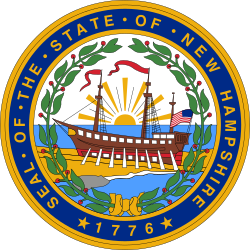| |||||||||||||||||
| |||||||||||||||||
Merrill: 40–50% 50–60% 60–70% 70–80% 80–90% >90% King: 40–50% 70–80% | |||||||||||||||||
| |||||||||||||||||
| Elections in New Hampshire |
|---|
 |
The 1994 New Hampshire gubernatorial election took place on November 8, 1994. Incumbent Governor Steve Merrill won re-election.
Contents
Merrill chose not to seek a third term in 1996, and following this election, the Democrats would control the governorship for 18 of the next 20 years.



